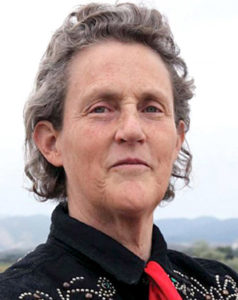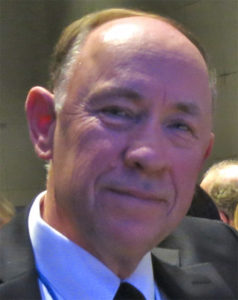Two Colorado State University faculty members, animal scientist Temple Grandin and atmospheric scientist Richard H. Johnson, have been named fellows of the American Association for the Advancement of Science.
This year, 396 members have been bestowed the title of AAAS Fellow for their “scientifically or socially distinguished efforts to advance science or its applications.” New fellows will be presented with an official certificate and a gold and blue (representing science and engineering, respectively) rosette pin on Feb. 17 during the 2018 AAAS Annual Meeting in Austin, Texas

Temple Grandin
Grandin, professor of animal sciences in the College of Agricultural Sciences, is being honored by the AAAS Section on Neuroscience for her “distinguished contributions to animal science and society, particularly her design of livestock handling facilities, and for her writings.” These writings, the citation continues, “have given voice to individuals with autism who cannot speak, thus providing insights into how each of us perceives the world in her own way.”
Grandin is a renowned animal behaviorist, a pioneer for autism awareness, and is known worldwide for her contributions to the livestock industry. Her insights into animal behavior have shaped innovative approaches to livestock handling, including methods and designs for humane slaughter that have become the industry standard.
Richard H. Johnson
Johnson, professor emeritus of atmospheric science in the Walter Scott, Jr. College of Engineering, is being honored by the Section on Atmospheric and Hydrospheric Science for his “creative design, execution and analysis of field experiments that have given insight into the interaction of convective clouds with large-scale atmospheric circulation.”

Johnson joined the CSU faculty in 1980. His research has been in atmospheric convection and mesoscale dynamic processes in the tropics and mid-latitudes, and the interaction of convection with the planetary boundary layer. Among his areas of study have been severe convective storms, the tropical Madden-Julian Oscillation, and clouds in the tropics and their central role in global atmospheric circulation. A specific focus of study has been on the Asian monsoon, which affects over half the world’s population.
AAAS fellows tradition
The tradition of AAAS fellows began in 1874. Members can be considered for the rank of Fellow if nominated by the steering groups of the association’s 24 sections, or by any three fellows who are current AAAS members, or by the AAAS chief executive officer. Fellows must have been continuous members of AAAS for four years by the end of the calendar year in which they are elected.
Each steering group reviews the nominations of individuals within its respective section, and a final list is forwarded to the AAAS Council, which votes on the aggregate list.
The council is the policymaking body of the association, chaired by the AAAS president, and consisting of the board of directors, the retiring section chairs, delegates from each electorate and each regional division, and two delegates from the National Association of Academies of Science.
Publisher of Science journals
The American Association for the Advancement of Science (AAAS) is the world’s largest general scientific society and publisher of the journal Science as well as Science Translational Medicine, Science Signaling, a digital, open-access journal, Science Advances, Science Immunology, and Science Robotics.
AAAS was founded in 1848 and includes nearly 250 affiliated societies and academies of science, serving 10 million individuals. Science has the largest paid circulation of any peer-reviewed general science journal in the world.
The non-profit AAAS has as its mission to “advance science and serve society” through initiatives in science policy, international programs, science education and public engagement. For the latest research news, log onto EurekAlert!, a service of AAAS.